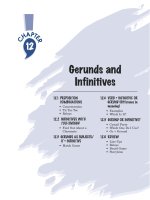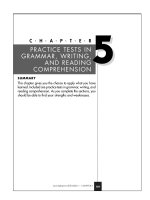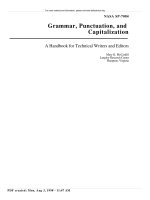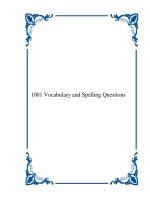Collins primary grammar punctuation and spelling
Bạn đang xem bản rút gọn của tài liệu. Xem và tải ngay bản đầy đủ của tài liệu tại đây (1.56 MB, 243 trang )
Contents
Cover
TitlePage
Introduction
Grammar
Whatisgrammar?
Words
Phrases
Clauses
Sentences
Makingwords
WritinggoodEnglish
Synonyms
Antonyms
Layout
Punctuation
Whatispunctuation?
Letters
Fullstop
Questionmark
Exclamationmark
Comma
Apostrophe
Invertedcomma
Bracket
Dash
Semicolon
Colon
Hyphen
Bulletpoint
Ellipsis
Spelling
Thealphabet
Syllables
Lettersandsounds
Consonantsandtheirphonemesandgraphemes
Vowelsandtheirphonemesandgraphemes
Digraphsandtrigraphs
Addingendingstowords
Irregularverbs
Addingprefixesandsuffixes
Commonendingsinwords
Choosingbetweenendings
Wordsendinginough
Silentletters
Someverycommonwordsthatyouhavetoknow
Homophones
Howtoimproveyourspelling
Dictionary
HowtousetheSpellingDictionary
Aa
Bb
Cc
Dd
Ee
Ff
Gg
Hh
Ii
Jj
Kk
Ll
Mm
Nn
Oo
Pp
Rr
Ss
Tt
Uu
Vv
Ww
Yy
Zz
Index
Copyright
AboutthePublisher
Introduction
CollinsPrimaryGrammar,PunctuationandSpellinghasbeendesignedtosupportallpupilswhoare
studyinggrammar,punctuationandspellingfromage7to11,whetherthisisforexamsortorevisethekey
buildingblocksoftheEnglishlanguage.
Itcontainstherulesandadvicethatwillhelpstudentsgettogripswiththeseessentialaspectsofthe
Englishlanguage.Thereareclear,easy-to-followexplanationsofhowgrammarworks,whatpunctuation
does,andhowtospellcorrectly.Eachsection–grammar,punctuationandspelling–islaidoutinan
open,attractivedesignthatguidestheusereasilythroughtheinformationprovided.Dozensofexamples
showexactlyhowtherulesofEnglishwork.
Thefinalsectionisadictionarylistofwordsthatpupilsmustknowhowtospell.Thesehavebeen
speciallyselectedforthisagegroupbasedonreal-lifeexperiencefromSpellingBeesconductedby
CollinsDictionaries.Thewordsarewrittenoutinfull,withtheirwordclassclearlyshown,alongwith
anyotherformssuchasplurals,comparativesandsuperlatives,andinflections–allofwhicharealso
writteninfull,makingiteasyforthepupiltounderstand.Manyhelpfultipsonspellingarealsoincluded
throughoutthespellingdictionarysectiontomakelearningeasier.
CollinsPrimaryGrammar,PunctuationandSpellingisanindispensableguidetothestructureandrules
ofEnglish,offeringclearandaccessibleguidanceforpupilsfromage7to11.
Explorefurtheratwww.collins.co.uk/homeworkhelpforgames,activitiesandextrasupportforparents
andchildren.
Grammar
Whatisgrammar?
Grammaristherulesofalanguagethattellyouhowtoorganisewordstomakesentences.Thinkabout
languageasaseriesof‘blocks’thatyouputtogether.Therearerulesabouthowtheseblockscanbe
joined.Theblocksare:
•theword
•thephrase
•theclause
•thesentence
Thisbookexplainswhattheseare,howtheyworkandhowyoucombinethemtowriteclearandeffective
English.
Words
Wordclass
Everywordinalanguagecanbesortedintoagroupaccordingtowhatitdoeswithinasentence.
Thesegroupsareknownaswordclassesorpartsofspeech.Somewordscanbelongtoanumberof
differentwordclasses.Thissectionexplainswhatthewordclassesareandwhattheydo.
Nouns
Anounisawordthatnamessomething.Inasentence,thenounsarethewordsthattellyouwhichpeople,
placesorthingsareinvolved.
Therearedifferentkindsofnouns.
Commonnouns
Thesenounsareusedtonameeveryexampleofacertaintypeofthing.Theystartwithasmallletter.
girl
city
picture
Therearethreedifferenttypesofcommonnouns.
Concretenouns
Aconcretenounisaphysicalobjectthatyoucanactuallytouch:
donkey
bicycle
doughnut
Abstractnouns
Anabstractnounissomethingthatdoesnotphysicallyexistandsocannotbetouched:
happiness
beauty
imagination
Collectivenouns
Acollectivenounisagrouporcollectionofthings:
pack
bunch
flock
Propernouns
Thesenounsareusedforaparticularperson,placeorthing.Theystartwithacapitalletter.
AndyMurray
Switzerland
RiverSeine
Singularandplural
Thesingularformofanounisusedtomeanonlyoneofathing:
apicture
oneelephant
theschool
Thepluralformisusedtomeanmorethanoneofathing:
twopictures
tenelephants
fourschools
Thepossessive
Thepossessive(whichissometimescalledthepossessivecase)isusedtoshowthatapersonorthing
ownsanotherpersonorthing.Youadd’stotheendofthenounthatistheowner:
mymother’ssister
Nick’sfootballboots
thecat’spaw
thestadium’sroof
Ifthenounisapluralthatalreadyendsins,youputanapostropheattheendoftheword:
thesoldiers’uniforms
thoseboys’bicycles
Africanelephants’ears
tractors’wheels
Youdon’tuse’stomakeapluralnoun.Itisonlyusedforshowingthepossessive.
Adjectives
Anadjectiveisawordthattellsyousomethingaboutanoun.Adjectivescandescribenounsinanumber
ofways:
howtheyfeelorwhattheyarelike:
ahappychild
astrangeboy
ajoyfuloccasion
whattheylooklike:
alargetree
aspottydress
agorgeousbeach
whattheysound,smell,tasteorfeellike:
anoisyparty
astinkycheese
adeliciouscake
ahardseat
whatcolourtheyare:
ayellowbag
darkhair
greenleaves
wheretheycomefrom:
ourGermanrelatives
myAmericanfriend
anorthernaccent
whatsomethingismadefrom:
chocolatecake
awoodenbox
avelvetscarf
Comparativeadjectivesandsuperlativeadjectives
Whenyouwanttomakeacomparisonbetweenpeopleorthings,youneedtousecomparativeor
superlativeadjectives.Intheexamplesbelow,talleristhecomparativeformoftallandtallestisthe
superlative.
Roryistall.
Roryistallerthanhisbrother.
Roryisthetallestboyinhisclass.
Comparative
Thecomparativeshowsthatapersonorthinghasmoreofacertainqualitythananotherpersonorthing.In
thiscaseitisthequalityofbeingtall.
Youmakethecomparativeformofanadjectivebyaddingthesuffix‑erattheend.
dull+‑er=duller
green+‑er=greener
clever+‑er=cleverer
Notallcomparativesaremadelikethis,though.Iftheadjectiveisquitealongword,youusemore
instead.
beautiful→morebeautiful
eccentric→moreeccentric
interesting→moreinteresting
Superlative
Thesuperlativeshowsthatapersonorthinghasthemostofacertainqualityoutofagroupofpeopleor
things.
Youmakethesuperlativeformofanadjectivebyaddingthesuffix‑estattheend.
dull+‑est=dullest
green+‑est=greenest
clever+‑est=cleverest
Iftheadjectiveisquitealongword,youusemosttomakethesuperlative.
beautiful→mostbeautiful
eccentric→mosteccentric
interesting→mostinteresting
Goodandbad
Theadjectivesgoodandbaddon’tfollowthenormalrulesforcomparativeandsuperlativeforms.
good
better
best
bad
worse
worst
Therearespellingrulesaboutaddingsuffixes,andyoucanseetheseonpages81–85.
Adverbs
Anadverbisawordthattellsyousomethingaboutaverb.Theydescribethewayinwhichsomethingis
done.Manyadverbsendwiththeletters‑ly.
Someadverbstellyouhow:
Ellarunsquickly.
Thechildrensingloudly.
Someadverbstellyouwhere:
Welivehere.
Theplaneflewsouth.
Someadverbstellyouwhen:
Sheisgoingonholidaytomorrow.
Phonethepoliceimmediately.
Someadverbstellyouhowmuch:
Ireallywanttoseethatfilm.
Hewascompletelyexhausted.
Someadverbstellyouhowoften:
Younevercomeouttoplayfootball.
MysisterandIalwaysargueaboutwhositsinthefrontseatofthecar.
Someadverbsgoatthebeginningofasentence.Thesegiveacommentonthewholesentence:
Fortunately,itdidn’train.
Sadly,Jackiecan’tcomeonFriday.
Prepositions
Aprepositionisawordthatisusedbeforeanounorapronountodescribehowthingsarerelatedor
connectedtoeachother.Forexample,prepositionscantellyou:
•whereapersonorthingis:
acatinthegarden
abookonthetable
asockunderthebed
Otherprepositionslikethisinclude:
above
beside
underneath
near
below
•themovementofsomethingorsomeone:
Thetraincameintothestation.
Wepushedthroughthecrowd.
Otherprepositionslikethisinclude:
around
down
up
onto
•theyalsoshowhowthingsarerelatedintime:
Ihaven’tseenmyauntiesincelastweek.
to
Conjunctions
Aconjunctionisawordthatisusedtojointwowordsortwopartsofasentencetogether.Therearetwo
maintypesofconjunction.
Co-ordinatingconjunctions
Aco-ordinatingconjunctionjoinstwothingsthatareasimportantaseachother:
Ilovefishandchips.
ItwasdrysoIwalkedhome.
Youcanhaveabiscuitoracake.
Shehasneithermothernorfather.
Itcanalsoshowacontrastbetweentwothings:
Joeishavingabirthdaypartybuthehasn’tinvitedme.
Subordinatingconjunctions
Asubordinatingconjunctionintroducesaclausewhichislessimportantthanthemainpartofthesentence:
Theteacherwasangrybecausethepupilswouldnotpayattention.
Markreadhisbookwhilehewaitedforhismumtoarrive.
Imusttellyousomeexcitingnewsbeforewegetstarted.
Somedogsgoabitcrazywhenit’swindy.
Pronouns
Apronounisawordthatisusedinplaceofanoun.Youuseapronouninsteadofrepeatingthenameofa
person,placeorthing:
Rachellivesnextdoortome.Rachelisinmyclass.
>Rachellivesnextdoortome.Sheisinmyclass.
ThatisthebookIamreadingjustnow.Thebookisveryfunny.
>ThatisthebookIamreadingjustnow.Itisveryfunny.
Iliketositinthegarden.Thegardenisverysunny.
>Iliketositinthegarden.Itisverysunny.
Personalpronouns
Youuseapersonalpronouninsteadofthesubjectorobjectofasentence:
Sheisgoodatmaths.
Nobodylikeshim.
Possessivepronouns
Youuseapossessivepronountoshowthatsomethingbelongstoapersonorthing:
Wehadtomoveoutwhenourhousewasflooded.
Ithinkthebluejacketismine.
Thedogburieditsboneinthegarden.
Relativepronouns
Youusearelativepronouninsteadofanountojointwodifferentpartsofasentence.Therelative
pronounsarewho,whom,whose,whichandthat.Theyintroduceinformationaboutanouninanearlier
partofthesentence.Thisnounisknownastheantecedent.Youusewho,whomandwhosewhenthe
antecedentisaperson,andwhichandthatwhenitisnotaperson.
who:Youusewhowhentheantecedentisthesubjectofthesecondclause.
IhaveanauntwholivesinAustralia.
whom:Youusewhomwhentheantecedentistheobjectofthesecondclause.
Itwasthesamemanwhomwehadseenearlier.
whose:Youusewhosetoshowthatsomethingbelongstotheantecedent.
ScotthasabrotherwhosenameisJamie.
which:Youusewhichwhentheantecedentisnotaperson.
Wetooktheroadwhichleadstothesea.
that:Youusethatwhentheantecedentisnotaperson.
Georgebroughtthesandwichesthathehadmadethenightbefore.
Determiners
Adeterminerisawordthatyouputinfrontofanountoshowmoreclearlywhatyouaretalkingabout.
Therearedifferentkindsofdeterminers:
Articles
Thewordtheiscalledthedefinitearticle.
therobot
thetraffic
thefootballers
Thewordaiscalledtheindefinitearticle.
acaravan
agiraffe
ascooter
Ifthewordafterabeginswithavowel,youuseaninstead:
ananimal
anumbrella
anorangepencil
Otherdeterminers
Othertypesofdeterminersgivedifferentinformationaboutthenoun:
•thedistancebetweenthespeakerandthethingtheyaretalkingabout:
thisshoe
thesebooks
thatman
thosehouses
•whoownsthething:
mybag
yourphone
hiskite
hermug
itsdoor
ourcar
theirgarden
•howmuchorhowmany:
somesugar
muchmoney
bothgirls
fewpeople
manyadults
severalbirds
•theexactnumber:
onemelon
thetwobrothers
fiftyroses
tenthousandyears
•howsomethingissharedout:
Everychildgotaprize.
Eachrunnerisgivenanumber.
Eitherteamcouldwinontheday.
Neithersideisplayingwellatthemoment.
Verbs
Averbisawordthattellsyouaboutanaction.
Emilyplaystheguitar.
Thechildrenranacrossthefield.
Wealwayslistentotheradiointhecar.
AndrewisaScout.
Tense
Thetenseofaverbtellsuswhentheactiontakesplace.
Presenttense
Iftheactionishappeningnow,youusethepresenttense.Therearetwotypesofpresenttenseyoucanuse:
Simplepresenttense:Forthisyouusetheverbasitis,oraddan‑sattheend:
Ilikebroccoli.
Youlovepeas.
Maxhatescarrots.
Weenjoyswimming.
MartinandKateplaythepiano.
Progressivepresenttense:Thisisalsoknownasthecontinuouspresenttense.Forthisyouaddthe
ending‑ingtotheverbandputaformoftheverbbeinfrontofit:
Iamdoingmyhomework.
Youareannoyingme.
Laraispaintingapicture.
Pasttense
Iftheactionhasalreadyhappened,youusethepasttense.Therearefourtypesofpasttenseyoucanuse:
Simplepasttense:Formostverbs,youadd‑edtotheendtomakethesimplepasttense.Youadd‑dif
theverbalreadyendsine:
Thechildrenscreamedwhenthelightswentout.
Thedogbarkedatthepostman.
Iscrambledoverthewall.
Progressivepasttense:Thisisalsoknownasthecontinuouspasttense.Youadd‑ingtotheverbandput
itafterwasorwere.Youusethistotalkaboutsomethingthatwasstillhappeningatacertainpointinthe
pastorwhensomethingelsehappened:
ThatwasthesummerwhenJackandIwerelearningtoride.
Richardwascookingdinnerwhenthefirealarmwentoff.
Presentperfecttense:Forthisyouusehasorhavewiththesimplepasttenseoftheverb.Youusethe
presentperfecttensetoshowthatanactionhasbeencompleted:
AbbyhasfinishedherprojectonJapan.
Ihavebakedacakeforthebirthdayparty.
Pastperfecttense:Forthisyouusehadwiththesimplepasttenseoftheverb.Youusethistoshowthat
somethinghadbeencompletedwhensomethingelsehappened:
Matthewhadfinishedhislunchbeforetheothershadevenstarted.
Ihadpackedmysuitcasewhenthetaxiarrived.
Futuretense
Iftheactionhasstilltohappen,youusethefuturetense.Youdothisbyusingwillorshallandthenthe
verb:
Iwillbethereontime.
Hesayshewillphonelatertoday.
Weshallseeifthat’strue.
Auxiliaryverbs
Therearethreeauxiliaryverbs:be,haveanddo.Theseareusedwithotherverbstomakedifferent
tenses.
Iwaswashingmyhair.
Thechickenhadcrossedtheroad.
Ididtidymyroomeventually.
Be,haveanddoareirregularverbs,whichmeansthattheydonotfollowtheusualrulesformakingverb
forms.
Be
Iamhappy.
Youaresad.
Sheistired.
Weareexcited.
Theyarelate.
Iwasworried.
Youwereangry.
Hewasscared.
Wewerejealous.
Theyweresleepy.
Heisbeingsilly.
Wehavebeenreadyforanhour.
Have
Ihaveacat.
Youhaveadog.
Shehasarabbit.
Wehaveaparrot.
Theyhavenopets.
Ihadanapple.
Youhadanorange.
Hehadapear.
Wehadsomegrapes.
Theyhadstrawberries.
Maryishavingababy.
Wehavehadnosleepfortwodays.
Do
Idonotlikeher.
Youdonotlikehim.
Shedoesnotlikeme.
Wedonotlikethem.
Theydonotlikeus.
Ididlikehim.
Youdidlikeher.
Shedidlikeyou.
Wedidlikethem.
Theydidlikehim.
Theboysaredoingtheirhomeworkintheirrooms.
Ihavedonewhatyoutoldme.
Modalverbs
Themodalverbsarecan,could,may,might,must,shall,should,will,wouldandought.Theyareused
withotherverbstoaddcertainmeaningslikepossibility,doubtorhavingtodosomething.Unlikeall
otherverbs,theydonotchangetheirspellings:
Icanrideabike.
OliviacanspeakItalian.
Myfriendscanallcometomyparty.
Icouldbelatesodon’twaitforme.
Youmayberight.
Imightgotothelibraryafterschool.
Youmustlistentotheteacher.
Shallwetakethedogforawalk?
Youshouldcleanyourteethatleasttwiceaday.
Willyouhangyourjacketup?
Iwouldloveacupoftea.
Weoughttoleavenow.
Phrases
Aphraseisagroupofwordswhichgotogether.
abusystreet
thefamilypet
verygoodattennis
Althoughaphrasemakessense,itisnotafullsentenceandneedsmorewordstomakeitcomplete.
Weliveonabusystreet.
ThefamilypetisatortoisecalledBob.
Mysisterisverygoodattennis.
Nounphrases
Anounphrasecontainsatleastonenoun.
atallgirl
anextremelytallgirl
anextremelytallgirlwithpiercingblueeyes
Adjectivephrases
Anadjectivephrasecontainsatleastoneadjective.
abrownbear
abigbrownbear
abigscarybrownbear
Verbphrases









